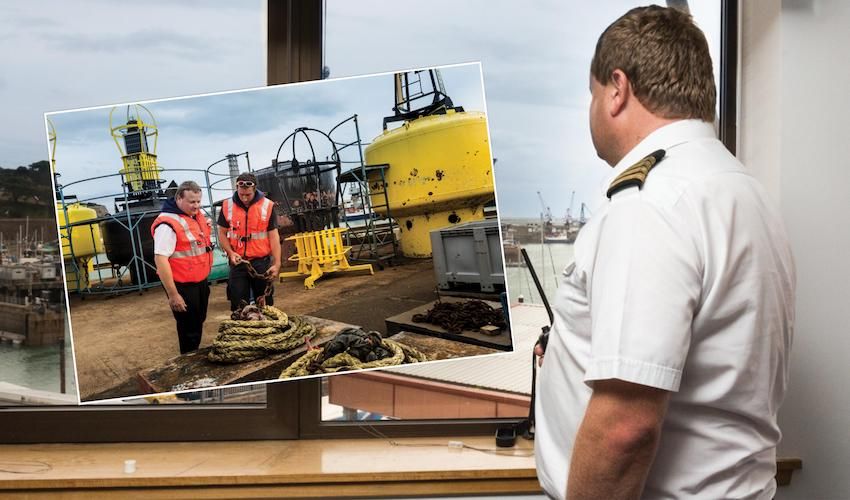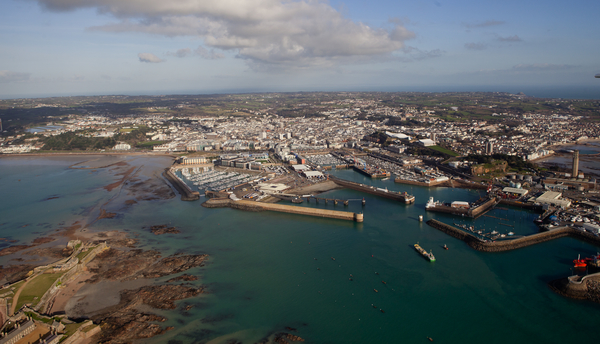

As an island, we are ruled by the sea, and that means we can’t do without the harbour - but most of us don’t think of it every day.
Unless, of course, it is your job to keep the port open and the boats coming in. Enter Jersey’s Harbourmaster, Bill Sadler.
With local food retailers relying on ‘just-in-time’ deliveries, and with very little storage space, an efficient harbour basically keeps food on the shelves – but important though that is, it is just one part of Bill Sadler’s day job, as Express found out...
In an era when ship-building is part of our maritime history and commercial litigation, not cod fishing, is the fastest way to a comfortable slab of St John real estate, our identification as a sea-faring nation could seem a little prosaic.
But think about any week when there have been consecutive days of storms, and the immediate impact that a lack of freight can have is a bit unnerving, if you dwell on it for too long. With a ‘just-in-time’ delivery system, the supermarket shelves thin out rapidly enough for us to remember how utterly dependant we are on shipping, and the smooth running of our main harbour.

Pictured: Harbourmaster Bill Sadler runs an "efficient harbour" to keep food on the shelves, but his job involves so much more than this (Gary Grimshaw).
Our gateway for fuel, food, furniture – and lots of other things that don’t start with ‘f’ - is our relatively small St. Helier Harbour. Consequently, the title of Harbourmaster is one that comes with significant responsibility and quite a few hats. The current wearer of all those hats is one Bill Sadler.
It is his job to make sure the boats come in and out, and that they do so safely, that the public service obligations of the ports are fulfilled, that the Jersey Coastguard is operational and ready to respond to calls, and that all the other functions of a working harbour run without incident and – as far as possible – in harmony. He is responsible for ensuring safety in Jersey’s territorial waters, enforcing shipping regulations which apply to those waters, and making sure all the buoys and beacons around Jersey are in place and operational.
In short, it is busy and demanding and a daily combination of duties which require a calm, steady hand, and so it is no coincidence – and supremely comforting – that Bill Sadler gives every impression of being pretty unflappable.
As calm as he may be while describing ‘deconflicting activity,’ and ‘mitigating risk’ at Jersey’s main port, he is also absolutely clear about the scale of the operation here, and its importance both to the wellbeing of the community and of commerce.
“St Helier deals with 500,000 tonnes of freight a year. That is more or less everything through this single gateway, so it is hugely important for the Island. If the harbour closes then we are in a real pickle. The logistics of the supply chain are very tight, and warehousing is very limited, so retailers do need those daily deliveries,” he said.
Lorries come in, the goods are distributed, and the lorries head off again on a 24-hour loop. “It is quite a feat of organisation.”
This is even more the case given that the harbour was not built for the volume of traffic it sees now – and in an ideal world, probably would not have been build where it is. Guernsey got the best deal here, apparently, with a deep-water entry in a more sheltered bay.
This daily tempo, ruled by the tides and the weather, provides the backdrop to a normal day – if such a thing exists – but of course this is only one function of the harbour office, and only one of the commercial activities of Ports of Jersey.

Pictured: Being Jersey's Harbourmaster "is quite a feat of organisation" according to Bill Sadler (Gary Grimshaw).
That daily traffic obviously includes the passenger vessels bolstering our tourist trade from Europe, England and Guernsey and increasingly from cruise ships. This flow is co-ordinated by the harbour managers and staff in the operations room.
While this has a predictability and structure to it, in this environment there will always be other elements at play, not least of which is the coastguard function, which at any time can pull heavily on resources.
“The Jersey Coastguard responds to about 150 incidents a year for people who are either in danger, to people who have broken down and whose situation might become dangerous. Search and rescue can be quite involved and, from a variety of services, can require up to 80 people, perhaps looking for one person; obviously that needs the control room co-ordination and the managers need to be able to flip between the roles that they have,” he said.
“The guys here are really good and it is rare to have the mix of skills that we do here. We are top heavy with quality. For instance, most harbours would be lucky to have one surveyor, but here we have three hydrographic surveyors."
There is also the annual ebb and flow of visitors which dictates more movement through Jersey’s ports in the summer months, and a drop in the winter traffic.
The role of Jersey Harbourmaster is very different to the ones that Bill has had before, partially because of the nature of work, and partly because he is able to go home to his family every night. “To be involved in maritime work, and be at home, is a win-win and it is part of what attracted us to Jersey. This is a different way of working - managerial work is a slow burn with projects which you look at over long periods of time. It is a very different tempo. I do try and get out piloting sometimes, so that I can keep my hand in operationally too.”
As he runs through his CV it becomes clear that is something of a tick-list of the different aspects of maritime work that a harbourmaster brings together – from the resilience and safety learned during a cadetship on tankers, to days as an officer on cruise ships, through to a more rarefied role maintaining buoys and lighthouses along the English coastline.

Pictured: "To be involved in maritime work, and be at home, is a win-win and it is part of what attracted us to Jersey" (Gary Grimshaw).
Like his father and grandfather before him, his career began with the Merchant Navy. He began his cadetship aged 16 with oil giant Mobil. “I am the third generation in my family to go to sea, although my father was an engineer and I still don’t think he has got over the fact that I went to be a deck officer. I was not hugely academic at school and the apprenticeship offered paid training and allowed you to go into a job at the end of it. It could be a difficult working environment,” he said.
It was one which, ultimately, he swapped for a far more polished life aboard a cruise ship. He stepped off a tanker in Rotterdam and on to the P&O Oriana in Venice. It was a very different existence and one that sounds incredibly exotic as he lists the ports and destinations. It is also where he met his wife Claire. “By the time we reached San Francisco we were firmly established as a couple.”
It was his work for Trinity House – an organisation set up by Henry VIII, which among other quirks has ancient rights to accompany the sovereign – looking after buoys and lighthouses which brought him back to closer shores. “The coast of England and Wales feels like my backyard.”
The long periods away from home were not, unsurprisingly, good for family life and Jersey has provided a balance for the Sadlers.
His scope of experience and obvious affinity for all things maritime allows him to see the ways in which the harbour office functions can complement, serve and maintain the safety of our adapting relationship with our own coast in Jersey.

Pictured: Bill Sadler's career began in the Merchant Navy which he says has informed his overseeing of the Harbour office in the island.
“One of Jersey’s biggest assets is the sea and scenery – it is the reason why people come to Jersey. The coastline here is stunning. People want to come and enjoy it and the way that they want to do that is changing. In the last 20 years we have seen many more leisure activities opening up.”
Encouraging the market for cruise ships is one aspect of this but there has also been a boom in sporting and adventure activities which are based around the sea and coastline and there are a number of local companies now making a living from this growth area. Whether that is in boat tours which offer something more spectacular than a chug around the coast, or the proliferation of water sports. Not a calm day passes without a few kayaks and paddleboarders rounding the head of bay between St. Brelade and Beauport.
Couple this with the more specialist competitive events which are now thriving here, like Breca Swimrun, the Jersey Triathlon and now the RBC Superleague Triathlon, and the future looks bright for business and pretty busy for Bill and his team.
Cod shipping and ship-building may well be part of our history, but the sea and coast still feed us, and our economy, every single day.
This article first appeared in October's edition of Connect magazine. Read it in full here.
Comments
Comments on this story express the views of the commentator only, not Bailiwick Publishing. We are unable to guarantee the accuracy of any of those comments.